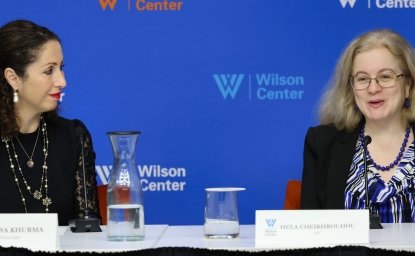American opponents of women's rights used to argue that "biology is destiny" and that therefore women's role in the world had to be limited to bearing and raising children. Women like my mother and me who wanted more than that felt like outsiders in the 1950s and 1960s –and in too many parts of the world this is still true.
In my case, John F. Kennedy's speech at the Los Angeles convention that nominated him for president in 1960 galvanized me with its call to public service and social change. His New Frontier, he said, would involve "not what I intend to offer the American people, but what I intend to ask of them." In college I studied government and decided to be a lawyer in order to be ready.
Millions of adolescent girls today aren't able to pursue their dreams the way I did. Each year, more than 14 million girls and young women are forced into marriage before the age of 18, usually to older men, and many of them are forced to drop out of school. Their horizons close far too early and their creative potential is lost. Often they cannot vote, own property, get credit or training, or hold public office. And most of these young girls, along with more than 220 million women worldwide, lack access to voluntary family planning services that give them the ability to plan their families, and their future.
But modern media now expose young girls worldwide to inspirational messages like JFK's, often from powerful women leaders in politics and the media, as well as from men. More and more are determined to contribute in every way to transforming their lives and societies. And in my lifelong work helping such girls and women overcome barriers to achievement, I have learned that the most direct and cost-effective method is through support for programs ensuring their access to education and to sexual and reproductive health care.
My father fled Nazi Germany for New York and then Los Angeles just after he had graduated from medical school. His final exam professor wouldn't look him in the face, he said, because he was Jewish. My parents raised me and my brother to aspire to professional lives, and my brother became a doctor. When I wanted to take the law board exams, however, I had to take them at all-male Amherst College because my women's college, Smith, didn't offer them. And when I got to Harvard Law School, I marveled at being only one of 30 women in a class of 550.
Eight years out of law school I was working as chief counsel and staff director for a U.S. Senate subcommittee on constitutional rights when my (male) chairman and I went to meet with U.S. Supreme Court Chief Justice Warren Burger. The judge told my boss he was surprised to see me. "When you said you were bringing your chief counsel, I was expecting someone....bigger," he said. I knew I was as big as I needed to be.
When I first ran for Congress in 1992, it was because I knew I had the skills and the voice to be at decision-making tables and that women legislators were essential to win our battles for equal rights, family-friendly workplaces and reproductive health care. That is still true in Congress.
In the almost 240 years of America's independence, only 294 women have served in Congress, compared to almost 12,000 men. That's about 40 men to every woman. But I had a role model: Geraldine Ferraro, a Democratic lawyer like myself who broke the glass ceiling to become the first woman vice-presidential candidate on a major national party ticket.
I'm proud that in my nine terms in the House I introduced legislation to prevent teen pregnancy through funding science-based programs rather than abstinence-only approaches that don't work. I was an early co-sponsor of the Family Medical Leave Act and the Violence Against Women Act, which provides services for victims of domestic violence and also works to end child marriage. And I was an early advocate against the epidemic of rape and sexual abuse in our military. As ranking Democrat on the House Intelligence Committee, I routinely insisted that national security was a women's issue, because women understand the need to protect their families, and women's rights and health are relevant to national security.
I've continued that focus at the Woodrow Wilson International Center for Scholars, where our Environmental Change and Security Program incorporates reproductive health as a critical element of sustainable livelihoods and international security. Our Women in Public Service Project promotes women's leadership in more than 40 countries, and our goal is to see women fill 50 percent of public service jobs worldwide by 2050. And I can personally testify that ambitious women have to be able to plan their families in order to have the time and energy for such work.
I am a mother of four and grandmother of four. Much has changed in the 21 years since I first ran for office. Today America has thousands of high-powered female lawyers and three female Supreme Court justices, and women are working in just about every job that used to be closed to us. So is biology really destiny? Well, we are still the only ones having babies.





